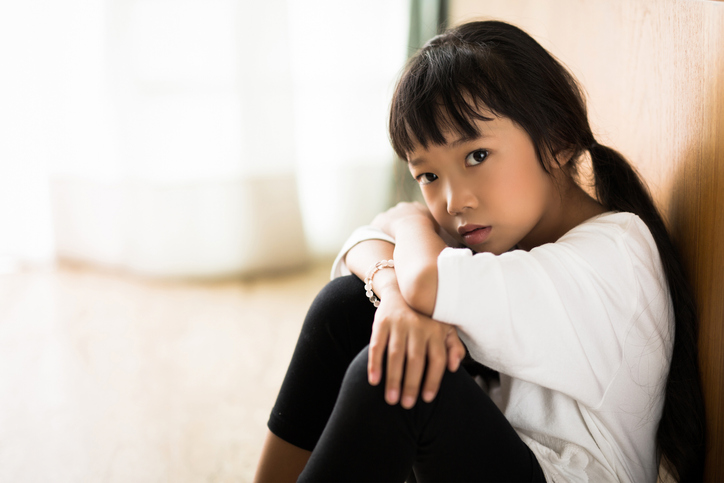Anxiety is tough enough to manage as an adult, but anxiety in children can be heartbreaking. Especially if you’re the parent of an anxious child.
You want to understand. You want to help. But the reality is that anxiety in children can be confounding and exhausting.
Many kids miss school, social activities or a good night’s sleep just from the worried thoughts in their head. While parents suffer from frustration and a feeling of helplessness as they watch their child struggling.
Related: 9 Tips For Helping Kids With Anxiety
If you’re a parent to an anxious child, or a parent wondering if your child’s worries might indicate an anxiety disorder, here are some things you need to know.
Symptoms Of Anxiety In Children
Anxiety is a normal part of childhood, and every child goes through phases. These phases are temporary and usually harmless.
However, sometimes the worries are more than just a phase. If they become persistent and you aren’t able to reassure or comfort the worries away, then your child may have an anxiety disorder.
And you’re not alone. Anxiety disorders affect one in eight children.
Research shows that children with untreated anxiety disorders are at higher risk to perform poorly in school, miss out on important social experiences, and engage in substance abuse.
Symptoms of anxiety in children can include:
- Excessive worry most days of the week, for weeks on end.
- Worry about routine, everyday things.
- Trouble concentrating and sleeping.
- Fear of social situations, leaving home, or separating from a loved one.
- Refusal to go to school.
- Physical complains, like headaches and stomach aches.
- Restlessness and irritability.
Related: Amazing Children’s Books About Anxiety Help Overcome Worries
If your child displays some or all of these symptoms, reach out to your health care practitioner or a child therapist to get a diagnosis. There are several types of anxiety disorders and you want to know which one you’re dealing with.
For more information on the various types of anxiety in children, you can check out the Child Mind Institute’s primer on anxiety basics.
The good news? Anxiety in children is very treatable!
If you’re a parent wondering how to help an anxious child, understanding these 19 things is a good place to start.
19 Facts About Anxiety In Children
- Anxiety disorders can and do run in families. Research suggest that there may be a genetic component to General Anxiety Disorder (GAD) and Obsessive Compulsive Disorder (OCD).
- Anxiety disorders may start after a traumatic event, but they are often not caused by any kind of trauma.
- Anxiety disorder symptoms may change, weaken and strengthen over time. They can also start and stop without warning.
- Behavior patterns that are a common part of anxiety include fidgeting, pacing, crying, clinging, or shaking.
- Avoidance is the main behavior pattern of anxiety. Things like refusing to do something they are afraid of, or avoiding new people and situations.
- Your anxious child is aware that their fears are irrational, and they want to get rid of their worries as much as you do.
- Anxiety in children can make kids feel physically sick.
- Anxious kids spend a great deal of time thinking “what if” thoughts.
- Kids who are anxious have a hard time with transitions, change, and new experiences.
- Anxiety in children under ten is common.
- Kids with anxiety may have panic attacks in their sleep.
- Children with anxiety tend to be more emotionally intelligent.
- Anxious kids are more likely to face their fears with some gentle encouragement from their parents.
- Young children with anxiety are more likely to be picky eaters.
- Anxious kids may have heightened senses, and they tend to be better at reading social cues.
- Children with anxiety tend to be very hard on themselves and strive for perfection. They may also seek constant approval or reassurance from others.
- Anxiety in children can cause intelligent kids to have worries that don’t make rational sense. Like a fear of random things falling from the sky or monsters in the closet.
- Research has shown that a form of psychological therapy (cognitive behavioral therapy) is effective in learning ways to overcome or manage anxiety.
- With treatment and support, kids can learn how to successfully manage the symptoms of an anxiety disorder and experience a normal childhood.
Related: 7 Ways to Ease Back To School Anxiety
SHARE what parents need to know about anxiety in children on Facebook and Pinterest by clicking the buttons below.












